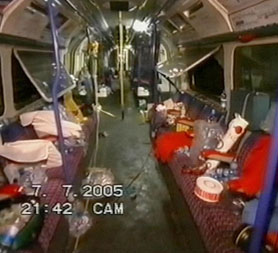‘Courageous’ survivors of July 7 bombings speak
An inquest into the deaths of the 52 people who died in the July 7 London bombings today heard testimonies from survivors in the Russell Square attack, which killed 26 people.

Paul Mitchell was severely injured when suicide bomber Jermain Lindsey blew himself up on a the first carriage of a packed Piccadilly line Tube train between King’s Cross and Russell Square stations on July 7, 2005.
He spoke about the “the complete and utter pandemonium” following the blast, how he owed his survival to a fellow passenger and his joy at being reunited with his wedding ring two weeks after it was blown off.
Mr Mitchell, who was on his way to work at Regent Street, had almost boarded the previous train and even stepped onto the carriage, but decided against it because the train was so full.
“There was complete and utter pandemonium, there were people screaming…I had my eyes closed out of sheer terror” July 7 survivor Paul Mitchell
Moments later the force of the blast sent passengers flying, blowing six of those killed onto the tracks.
“There was complete and utter pandemonium, there were people screaming and I thought my hair was on fire. I had my eyes closed out of sheer terror,” Mr Mitchell said.
He told the inquest at the Royal Courts of Justice how he became trapped under metal debris with a seriously-damaged leg and entwined with other people.
‘Passenger saved my life’
Mr Mitchell said he only survived because of the efforts of fellow passenger Julie Gruen, who helped him tie a tourniquet around his damaged leg, using her coat and a sanitary towel.
He said: “It undoubtedly saved my life, I feel.”
But it was only as he was being carried from the carriage on a stretcher – up to an hour later – that he realised his ring was missing.
“I was extremely worried that I had lost my wedding ring at the time,” he said.
But luckily police found the ring in the tunnel and returned it to Mr Mitchell a fortnight later.
As he concluded his evidence, coroner Lady Justice Hallet said: “I’m glad you have got your wedding ring back. I think your wife might have forgiven you.”
Fireball
Ms Gruen, appearing via video link, wept as she recounted fearing for her life as a “huge fireball” tore through the carriage, blowing her backwards. She said: “I remember looking at it, then just thinking, you know, next thing I’ll be gone.”
Ms Gruen, who boarded the Tube train at Finsbury Park, said she was listening to her iPod when 19-year-old Lindsay denoted his home made bomb.
Recalling the moments immediately after, she said: “I could sort of make out someone on the floor and thought it was just out of some kind of horror film.”
“There were still commuters going down the other side of the escalator and down the steps, unaware of what had happened.” Survivor Julie Gruen
She was quickly able to reassure fellow passengers and help Mr Mitchell, who was lying across 22-year-old Philip Beer, one of the 26 victims.
Mr Beer, a hairdresser from Borehamwood, Hertfordshire, responded to conversation and continued talking until Mr Mitchell was removed from the carriage, about 45 minutes following the blast.
Ms Gruen said that was around the time a fireman broke down the door between the first and second carriages so the trapped passengers could escape.
She emerged from the tunnel at King’s Cross station and headed for the surface with fellow survivor Matthew Brooks, who had part of his face “blown away” by the blast.
‘Commuters had no idea’
As Ms Gruen neared ground level on an escalator, she was shocked to see Tube users heading down to the Underground lines, oblivious to what had happened.
She said: “There were still commuters going down the other side of the escalator and down the steps, unaware of what had happened.
“They were looking at Matthew and myself. They were seeing us for the first time and their faces were just in disbelief. They had no idea what had just happened.”
Lady Justice Hallett praised Ms Gruen’s heroism.
She told her: “From what Mr Mitchell told me earlier this morning, it sounds as if your prompt action contributed to saving his leg, if not contributed to saving his life.
“So thank you for assisting him and your other fellow passengers, and thank you for assisting me.”
Closed sessions bid ‘useless’
MI5’s argument that the coroner for the 7/7 inquests has powers to hold closed sessions to hear top secret evidence was dismissed as “hopeless” by a senior judge today.
Lady Justice Hallett earlier rejected calls from MI5 and Home Secretary Theresa May for the families of those killed in the 2005 London bombings to be excluded from hearings while she examines highly sensitive intelligence material.
The inquests into the July 7 attacks on London’s public transport network will next year examine alleged failings by the police and MI5.
Bereaved families want to ask intelligence officials why they did not follow up plot ringleader Mohammed Sidique Khan and his accomplice, Shehzad Tanweer, after surveillance officers watched them meeting known terror suspects 17 months before the bombings.
The Home Secretary’s legal team argued that the coroner would not be able to reach accurate conclusions about MI5’s involvement in tracking the 7/7 bombers without seeing the secret evidence, which cannot be revealed in open sessions.
Lord Justice Kay ordered that Mrs May must announce by 10 December whether she is applying for permission for a “leapfrog appeal” directly to the Supreme Court, so as not to hold up proceedings.